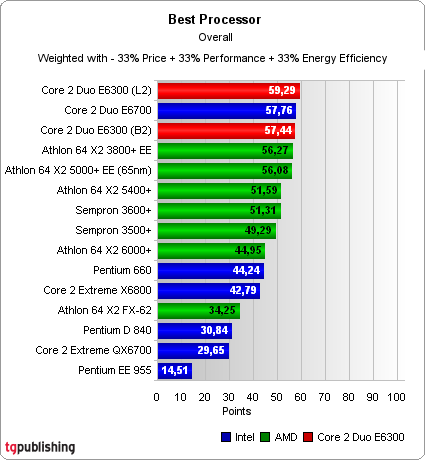Energy Efficiency: AMD vs. Intel
Energy Efficiency: AMD vs. Intel
Overall Results: L2 Stepping Takes the Lead
To determine the optimal processor from our previous analyses, we tallied up the speed of our four benchmarks, the power consumption and the processor price. Since a processor's performance plays a deciding role, the benchmarks make up 50% of the end result, with the other two categories each weighing in at 25%.
The Core 2 Duo E6300 with the L2 stepping asserts itself as the optimal processor, making it the winner of this energy efficiency article.
We were positively surprised by AMD's processors, which were able to leave Intel's - very expensive - flagship models behind with ease. The Athlon 64 X2 3800+ can still give Intel's Core 2 processors some grief.
Conclusion: AMD still Offers Lowest Power Consumption despite L2 Stepping
The new L2 stepping of Intel's Core 2 Duo processors is a real improvement with no drawbacks - it offers reduced power consumption at the same price. Its lower power dissipation even qualifies it for passive cooling. There is one caveat, though, namely that the new version can not be bought from online shops because of missing information. You may have better luck at your local computer store, depending on how cooperative the staff are.
Almost all motherboards require a BIOS update in order to work with the new L2 stepping. Some boards wouldn't even POST without such an update. The worst case scenario would be that you take home your brand new processors and motherboard from the store - and nothing works. Sadly, this is not an isolated case with Intel.
Whenever low acquisition costs, low follow-up costs as well as low power consumption are important, AMD's processors are still first choice. AMD also currently offers the cheapest dual-core processor. Finally, AMD processors are very suitable for use in quiet systems.
A look at power consumption is important: Our projections for a year's electricity bill ranged from €48 to €221, depending on the processor. A cheap but inefficient processor may prove expensive in the long run.
Get Tom's Hardware's best news and in-depth reviews, straight to your inbox.
In conclusion, we would like to say again: The CPU is not the only component that makes a PC energy efficient. Choose the wring motherboard or power supply and the most energy efficient processor in the world won't do a bit of good.
Current page: Energy Efficiency: AMD vs. Intel
Prev Page Energy Efficiency: AMD vs. IntelTom's Hardware is the leading destination for hardcore computer enthusiasts. We cover everything from processors to 3D printers, single-board computers, SSDs and high-end gaming rigs, empowering readers to make the most of the tech they love, keep up on the latest developments and buy the right gear. Our staff has more than 100 years of combined experience covering news, solving tech problems and reviewing components and systems.

